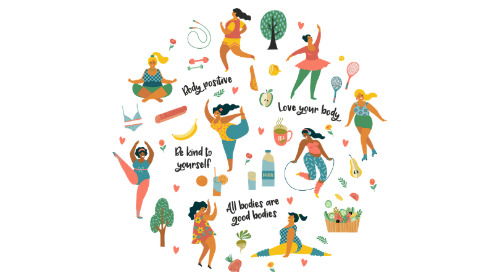Words by Alice Stevens
Content Warning: dieting and eating disorders
Body image is a funny one in January. The first month of the year should be a space for reflection and appreciation, especially for our bodies that have amazingly kept us safe and alive amidst a worldwide pandemic. But instead, many of us are left ashamed, anxious and feeling generally bad about ourselves. It just so happens that this time of year is a difficult one for many, like myself, who have past experiences with disordered eating and therefore would like to ignore the diet culture madness that wants us to believe we are not good enough as we are. This is especially apparent when we think about how different December and January are when it comes to just talking about food – eat all the food you want, drink, enjoy yourself, be merry – but as soon as January comes around, it’s a constant cycle of false diet adverts, gym membership discounts, countless exercise plans, juice cleanses, diet shakes – the list goes on. The diet industry thrives this time of year, making us feel bad for eating one too many stuffing balls or enjoying the Christmas selection box your grandma bought you.
Here are just a few truths the diet industry doesn’t want you to know:
- 95% of diets end in failure
- The stigma you may face because of your weight is much more dangerous than what you eat
- Dieting is a $60.5 billion dollar industry
- Diet culture is built on patriarchy, sexism, white supremacy, racism and colonialism (which all pushes white eurocentric standards of beauty)
- BMI is not an accurate predictor of health
- Body shape does not reflect health
- There is a large correlation between diet culture and eating disorders
- Beauty standards are unattainable
- Your worth is not tied to your appearance
Diet culture is a phenomenon feminists have researched for many years in an attempt to uncover the gendered meanings and power reactions dieting has been built upon. This is especially poignant when regarding the intersections of patriarchy, sexism, white supremacy and racism that hides under the guise of the diet industry. Now, this is not to say that you shouldn’t want to lose weight, exercise or eat healthier – its to say that we must have a nuanced understanding of how our perceptions of our bodies are shaped in relation to power, such as the diet industry, so we can begin to love and appreciate our bodies for what they are – diverse. This acknowledgement can also allow us to deconstruct how we can do better when it comes to going on a diet in ways that are healthy and long-lasting.
This is why body positivity to me is so important. Body-positivity is about reclaiming ourselves from the prying eyes of the diet industry, an industry that wants to capitalise on our insecurities, insecurities that have been created by the ‘ideal eurocentric beauty standard’ that society has pushed on us since birth. Reclaiming ownership can mean different things to different people, it can range from loving ourselves for what we are, trying to ignore the harmful body ideals, or exercising when you actually want to and enjoying it! For me personally, moving my body and eating what it needs, when it needs is a pleasure and a huge privilege. Rebuilding my relationship with food has been a long and hard journey, but it has truly transformed my life. I know it is difficult to ignore the damaging narrative and structures that have defined our social world, but it’s crucial that we begin to acknowledge these epistemologies in order to tackle such messages in order to feel content in our own skin. Just because it’s a new year, it doesn’t mean you should punish yourself for what you did or didn’t eat over Christmas, your body deserves to be nourished and happy! Trust me, you can do this.
If you would like to read further into diet culture and its relation to fat-phobia, intersectional oppression and the need for social justice, I highly recommend these 3 books:
- Anti-Diet: Reclaim Your Time, Money, Well-Being and Happiness Through Intuitive Eating by Christy Harrison
2. The Politics of Weight: Feminist Dichotomies of Power in Dieting by Amelia Morris
3. Fearing the Black Body: The Racial Origins of Fat Phobia by Sabrina Strings
Sources:
http://www.nationaleatingdisorders.org/get-facts-eating-disorders.
The Renfrew Center Foundation for Eating Disorders, Eating Disorders 101 Guide: A Summary of Issues, Statistics and Resources, 2003.
Strings, S. (2019). Fearing the black body: The racial origins of fatphobia
Gutin, I. (2017). In BMI we trust: reframing the body mass index as a measure of health. Social Theory & Health, [online] 16(3), pp.256–271. Available at: https://www.ncbi.nlm.nih.gov/pmc/articles/PMC6469873/
http://eatingdisorders.ucsd.edu/research/biocorrelates/PDFs/Kaye2010NeurobiologyofAN.pdf

